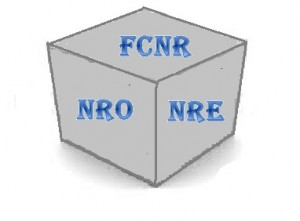Not only the Indians living in India can have their accounts in the banks of India, but the people who leave India and reside in some other country or become NRIs (Non-Resident Indian) and PIOs (Person of Indian Origin) can also maintain their accounts in India enjoying the various benefits of the accounts as applicable.
Three forms of such bank accounts in India are:
![]()
Non Resident Ordinary (NRO) account is a Savings Account or Current Account or Fixed Deposit Account or Recurring Deposit account opened by NRIs and PIOs.
It is a rupee denominated account i.e. the amount in the account is maintained in Indian Rupees.
Facilities and Advantages of NRO account:
- The NRIs and PIOs who transfer from India and have funds gathered in India like rent income, pension, etc. can enjoy the benefits of NRO account.
- If the residents who leave India have account in India, then that account can be converted to NRO account with the same account number.
- So the account is efficient for maintaining local rupee earnings in India while living abroad.
- Joint account facility and nomination facility is available with Indian residents.
- Cheque book and ATM card facility is available for joint accountee in India.
- The credit balances in NRO account are subject to respective income tax bracket.
- The funds are not repatriable except for the following:
(i) all current income and
(ii) up to USD 1 (one) million per financial year (April-March), by A NRI/ PIO.
![]()
Non Resident External (NRE) account is a rupee denominated account which can be Savings Account or Current Account or Fixed Deposit Account or Recurring Deposit account opened by NRIs and PIOs.
Facilities and Advantages of NRE account:
- The NRIs and PIOs who want to transfer their foreign earnings to India can enjoy the benefits of NRE account.
- So the account is efficient to use foreign earnings in India while living abroad.
- It is a safe and simple online money transfer service.
- Joint account facility and nomination facility is available with other NRIs or Indian Residents.
- Loan facility is also available against funds in NRE account.
- The principal amount and the interest paid on the amount are not taxable in India.
- It is a repatriable account i.e. the funds in account can be converted to any foreign currency.
![]()
Foreign Currency Non Resident (FCNR) account is a term deposit account that can be maintained by NRIs and PIOs in foreign currency. So this means it is not a savings account. Authorized dealer banks in India can allow deposits in any of the permitted currency (currency freely convertible).
Facilities and Advantages of FCNR account:
- The NRIs and PIOs who want to keep their savings as fixed deposits in Indian banks can apply for FCNR account. They can gain more rate of interest in India than abroad.
- The maturity period of term deposit ranges from 1 year to 5 years.
- The account is maintained in foreign currency so the money is not converted to Indian Rupees as in case of NRO account.
- So there is no Foreign Exchange risk, for example: if you deposited $100 in the account with 1% rate of interest, after 1 year on maturity you will get $ 101 irrespective of what the previous or current currency rates are.
- Funds in FCNR account can be used for making local payments in India.
- Joint account facility and nomination facility is available with other NRIs or Indian Residents.
- Loan facility is also available against funds in FCNR account.
- The principal amount and the interest paid on the amount are not taxable in India.
- It is a repatriable account i.e. the funds in account can be converted to any foreign currency.
Definitions of NRI :
- First, it is important to understand one’s residential status after moving abroad. The Income Tax Act, 1961 (ITA) and Foreign Exchange Management Act, 1999 (FEMA) have varying definitions for a Non Resident Indian.
- According to the ITA, an Indian citizen who moves abroad for the purpose of employment may be termed as a non-resident of India if he/she is not physically present in the country for over 181 days in a financial year (April to March). However, if the number is 60 days or more, ensure your time spent in India is less than 365 days, across the previous four years.
- On the other hand, as per FEMA, a person who has left India for the purpose of employment outside the country is considered as an NRI from the date on which he/she left India. So, while a person may be termed an NRI under FEMA, he may still be considered as a resident of India under the ITA. In this case, it is best to reveal the intention of the length of the stay outside India to the bank authorities and then open the desired bank accounts.





